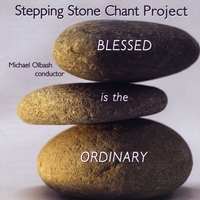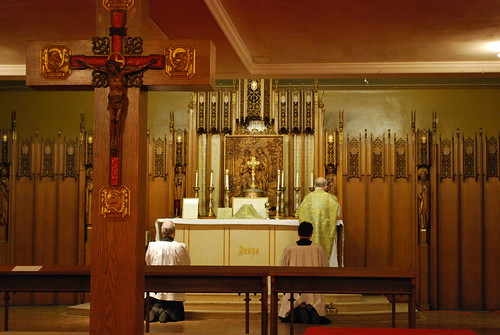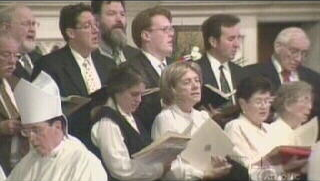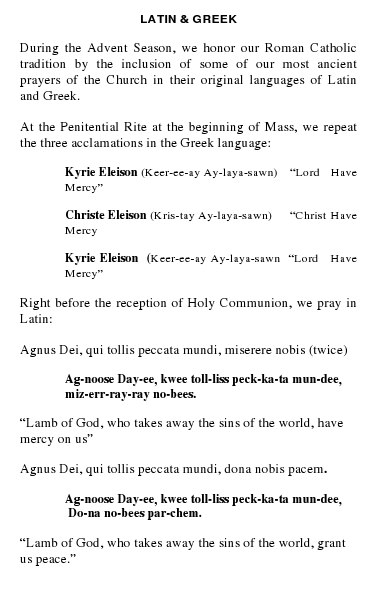When the Pope started the Mass at Nationals Park, he began it with the words: "In the name of the Father, and of the Son, and of the Holy Spirit."
This must have surprised many people who are used to hearing other greetings such as "Good morning, everyone," before or after the Trinitarian invocation. But the faithful attending did respond with, "And also with you," instead of "Good morning, father" or whatever. So it's good to know that we Catholics are at least a little teachable.
OK, now to liveblog, if not to say nitpick, the music of the Mass:
Kyrie eleison: the invocations were set to some black-gospel-inspired music, and came across as rather self-indulgent: they drew attention to the deacon's virtuosity. However, the "Kyrie eleison" responses were quite nice.
Gloria in excelsis Deo: The Gloria was accompanied by some handbells that didn't seem quite in harmony with each other. The text was chopped up artificially to give it a responsorial form. Here a pattern started to appear: apparently any old music was thought to be just fine, provided one slapped a few words of Latin on it. If the modern liturgists in charge of this production think they've solved the problems facing the contemporary music establishment with this tactic, they've got another think coming.
1st Reading: Acts, in Spanish. Is it really normative that a lay person not invested in the ministry of lector (lay women are not eligible for it) present the Scripture reading?
Responsorial Psalm: The music was a Broadway-style number, with weird dissonances in the setting of the verses and the refrain. It started out as laughable and ended as horrifying. Too bad that no-one was capable of singing the proper from the Roman Gradual, as the GIRM prefers.
2nd Reading: Romans 8: Another lay woman reading the Scripture, and reading it well enough. But what about diversity: is there some problem with lay men? Are they unacceptable?
Alleluia: a modern composition built on the refrain from O filii et filiae. This illustrates that even some antique hymns written in chant notation are not suitable for this sort of liturgical use. O filii et filiae is the Renaissance's equivalent of the Celtic Drinking Song Alleluia: a "rousing" number in triple meter. Let's all lock arms and sway, right? Um, let's not. It's not an ideal preparation for listening to the Holy Gospel.
The Homily was a wonderful word of encouragement to the faithful to be a faithful leaven in society. The Pope is not unaware that the Church here needs to accept the practice of penance and follow the way of holiness. We need to engage in sound catechesis, and Catholics need to "cultivate an intellectual culture that is truly Catholic", ringing the insight of Christian thought and judgment to society, lest we be merely conformed to the every vagary of the latter.
The General Intercessions were, as Fr. Neuhaus pointed out, a display of multiculturalism. Whom are we trying to impress in the General Intercessions?
The offertory music was a bit of Latino dance music performed with bongos and, I think, an ocarina or maybe a Peruvian flute. At the "breakdown" of the song, there was clapping. I don't think the Offertory proper was sung.
It was good to see the altar adorned with a crucifix and six candles in the arrangement that has come to be described as "Benedictine".
And then the most amazing thing happened. As Jeffrey Tucker has already commented on the NLM blog, Marty Haugen's setting, his Mass of Creation became a surprising moment of relative musical dignity.
There seemed to be no bells at the consecration, which is odd since there was plenty of handbell ringing during the Gloria.
The memorial acclamation was introduced by a fanfare of car horns, I believe, and they were used again for the Amen.
Now, at this point of the Mass, I stepped into my kitchen for a few minutes, so I missed the Our Father. Was it sung? I didn't notice it.
The Agnus Dei was another multi-culti display. Apparently singing the little litany in Latin plus several obscure languages to some strange music is better than singing it in Latin. The result was a piece that no one could reasonably use in any parish whatsoever.
The Communion selections included everything but the kitchen sink, except for the proper. One of them was a merengue number. One was the Cesar Franck Panis Angelicus, sung by Placido Domingo: the only piece of music in the entire Mass that visibly pleased the Holy Father.
So thanks be to God, the successor of Peter has come to strengthen us, to exhort us, and -- now that he has experienced the genius that is American-style liturgy at its ultimate -- he has come to suffer with us.



 a Saturday 4 pm Mass. They had a pretty competent organist at the console today, which you can't usually count on at this church, so it was a good start.
a Saturday 4 pm Mass. They had a pretty competent organist at the console today, which you can't usually count on at this church, so it was a good start.

